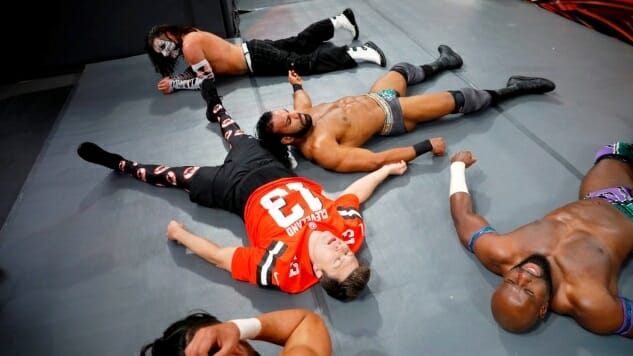WrestleMania Will Still Go On, Despite the Coronavirus, and Against All Common Sense
What If They Held a WrestleMania and Nobody Came?
Photo courtesy of Getty Images
This was supposed to be the biggest week of the year for wrestling. When WWE announced in March 2019 that WrestleMania 36 would be happening in Tampa this upcoming weekend, they couldn’t have expected that the entire country would be shut down by the time the date arrived due to a pandemic. And since WrestleMania week has become a kind of holiday for the entire industry, with smaller promotions hosting what are usually their biggest and most profitable shows of the year in the same city during the same week, this has become bigger than just WWE or WrestleMania. This week was supposed to be the SuperBowl, the Final Four and the Olympics combined for wrestling fans and the business itself, and the coronavirus has pulled the mat out from under everybody.
One promotion hasn’t cancelled its big weekend shows, though, and that’s WWE. WrestleMania will still be happening this weekend, although at a different venue, without a crowd, and spread over two nights instead of just one. Raymond James Stadium, the home of the Tampa Bay Buccaneers, is out; the WWE Performance Center, their training and production facility in Orlando, is in. WrestleMania doesn’t air until Saturday April 4 and Sunday April 5, but the whole show has already been taped, along with the episodes of Raw and Smackdown that air before and after the show. Also, due to the virus, one of the two main events has been scrapped; Roman Reigns, whose battle with leukemia has left him especially susceptible to COVID-19, will no longer be facing Goldberg for one of the company’s two major titles. A few other wrestlers were also bumped from the show, and the customary battle royals were dropped due to the recommended rules against larger gatherings. It’s the first WrestleMania to take place over multiple days, the first one to happen without an audience, and the first one to not air live, and it’s missing one of its marquee matches.
Given all that, how exactly is this a WrestleMania, then?.
Like the company itself, WWE’s biggest show of the year has always valued pageantry and bombast over anything else. WrestleMania is supposed to overwhelm the fans in pretty much every way, from the massive football stadiums that have become its annual home, to the exhausting runtimes the show has stretched out to over the years. (Before this weekend’s was split over two nights, Sunday night’s scheduled show was expected to run for up to eight hours.) WWE itself has increasingly marketed the show as being less about matches or storylines, but specific moments—with every wrestler supposedly desperate to have his or her own career-defining “WrestleMania Moment.”
WrestleMania isn’t a wrestling show at this point. What started as the culmination of a year’s worth of wrestling storylines with the spectacular presentation of a SuperBowl has become solely about the spectacle itself. The matches are just a backdrop for lights, fireworks, intricate sets, the loving shots of a massive audience, and WWE’s endless self-congratulation. As with everything about WWE, it’s not about the wrestlers or their matches, but the company itself, and how big and popular and successful it is, even as TV ratings continue to plummet.
-

-

-

-

-

-

-

-

-

-

-

-

-

-

-

-

-

-

-

-

-

-

-

-

-

-

-

-

-

-

-

-

-

-

-

-

-

-

-

-








































